Related Research Articles

Namibia, officially the Republic of Namibia, is a country in Southern Africa. Its western border is the Atlantic Ocean. It shares land borders with Zambia and Angola to the north, Botswana to the east and South Africa to the south and east. Although it does not border Zimbabwe, less than 200 metres of the Botswanan right bank of the Zambezi River separates the two countries. Namibia gained independence from South Africa on 21 March 1990, following the Namibian War of Independence. Its capital and largest city is Windhoek. Namibia is a member state of the United Nations (UN), the Southern African Development Community (SADC), the African Union (AU) and the Commonwealth of Nations.

Politics of Namibia takes place in a framework of a semi-presidential representative democratic republic, whereby the President of Namibia is both head of state and head of government, and of a pluriform multi-party system. Executive power is exercised by both the president and the government. Legislative power is vested in the two chambers of Parliament. The judiciary is independent of the executive and the legislature.

The South West Africa People’s Organisation, officially known as the SWAPO Party of Namibia, is a political party and former independence movement in Namibia. Founded in 1960, it has been the governing party in Namibia since the country achieved independence in 1990. The party continues to be dominated in number and influence by the Ovambo ethnic group.

Theo-Ben Gurirab was a Namibian politician who served in various senior government positions. He served as the second Prime Minister of Namibia from 28 August 2002 to 20 March 2005, following the demotion and subsequent resignation of Hage Geingob. Previously he was the country's first Minister of Foreign Affairs from 1990 to 2002, and was President of the United Nations General Assembly from 1999 to 2000. He was Speaker of the National Assembly of Namibia from 2005 to 2015, when he was replaced by Peter Katjavivi. Gurirab ultimately resigned from politics in 2015.

Hifikepunye Lucas Pohamba is a Namibian politician who served as the second President of Namibia from 21 March 2005 to 21 March 2015. He won the 2004 election overwhelmingly as the candidate of SWAPO, the ruling party, and was reelected in 2009. Pohamba was the president of SWAPO from 2007 until his retirement in 2015. He is a recipient of the Ibrahim Prize.

Elections in Namibia determine who holds public political offices in the country. Namibia is a semi-presidential representative democratic republic. It runs direct elections every five years for the position of the president and seats in the National Assembly, and every six years for the Regional Councils and the distribution of seats in local authorities. The National Council is elected indirectly by the constituency councillors of Namibia's 14 regions.
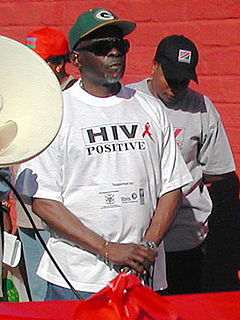
Nahas Gideon Angula (born 22 August 1943 is a Namibian politician who served as the third Prime Minister of Namibia from 21 March 2005 to 4 December 2012. He was succeeded by Hage Geingob in a cabinet reshuffle after the 2012 SWAPO Party congress. He subsequently served as Minister of Defence from 2012 to 2015.
Marco Mukoso Hausiku was a Namibian politician who was Deputy Prime Minister of Namibia from 2010 to 2015. Previously he served as Minister of Foreign Affairs from 2004 to 2010. In 2017 he was elected Deputy Secretary-General of the Swapo Party at the party's 6th Congress.

Justus ǀUruhe ǁGaroëb is a Namibian traditional authority leader and politician. He was a staunch opponent of South African rule and led the oppositional Namibia National Front in the late 1970s. He became Gaob (king) of the Damara people in 1982 and founded the United Democratic Front (UDF) in 1989.

The Popular Democratic Movement (PDM), formerly the Democratic Turnhalle Alliance (DTA), is an amalgamation of political parties in Namibia, registered as one singular party for representation purposes. In coalition with the United Democratic Front, it formed the official opposition in Parliament until the parliamentary elections in 2009. The party currently holds 16 seats in the Namibian National Assembly and one seat in the Namibian National Council and is the official opposition. McHenry Venaani is president of the PDM.

Hage Gottfried Geingob is a Namibian politician, serving as the third president of Namibia since 21 March 2015. Geingob was the first Prime Minister of Namibia from 1990 to 2002, and served as prime minister again from 2012 to 2015. Between 2008 and 2012 Geingob served as Minister of Trade and Industry. He is also the current president of the ruling SWAPO Party since his election to the position in November 2017.
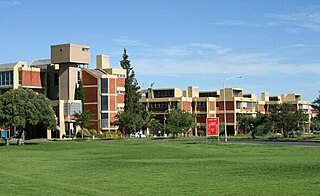
The University of Namibia (UNAM) is a multi-campus public research university in Namibia, as well as the largest university in the country. It was established by an act of Parliament on 31 August 1992.
Herman Andimba Toivo ya Toivo was a Namibian anti-apartheid activist, politician and political prisoner. Ya Toivo was active in the pre-independence movement, and is one of the co-founders of the South West African People's Organisation (SWAPO) in 1960, and before that, its predecessor the Ovamboland People's Organization (OPO) in 1959.

The National Council is the upper chamber of Namibia's bicameral Parliament. It reviews bills passed by the lower chamber and makes recommendations for legislation of regional concern to the lower chamber.

White Namibians are people of European birth or descent living in Namibia. The majority of White Namibians are Afrikaners, with many of the White minority being German Namibians. Many are also Portuguese or English immigrants. Current estimates of the White Namibian population run between 75,000 and 150,000. This imprecision in data is because the Namibian government no longer collects data based on race.

Manny Simão Franca de Freitas is a South African politician, currently a Member of Parliament with the Democratic Alliance, was appointed as the Shadow Deputy Minister of Transport from 2009 to 2012, Shadow Minister of Home Affairs from 2012 to 2014 and Shadow Minister of Transport in 2014, a position he held until the end of term in 2019. After the 2019 Elections, de Freitas was appointed as Shadow Minister of Tourism.

Namibia is divided into 14 regions subdivided, which are further subdivided into 121 constituencies. The administrative divisions of Namibia are tabled by Delimitation Commissions and accepted or declined by the National Assembly.
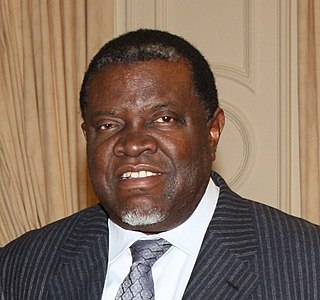
General elections were held in Namibia on 28 November 2014, although early voting took place in foreign polling stations and for seagoing personnel on 14 November. The elections were the first on the African continent to use electronic voting.
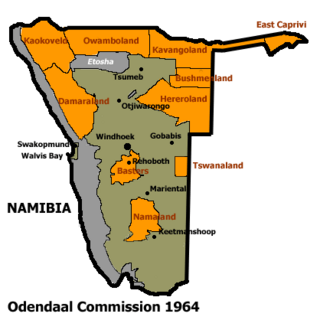
Constance Letang Kgosiemang was the paramount chief of the Tswana people in Namibia, a parliamentarian, and the leader of the Seoposengwe Party until its merger into the Democratic Turnhalle Alliance (DTA).
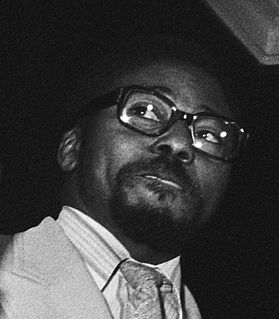
Peter Hitjitevi Katjavivi is a Namibian politician who is the Speaker of the National Assembly of Namibia since March 2015 and the chancellor of the Namibia University of Science and Technology from 1992 to 2003. Previously he was the founding Vice-Chancellor of the University of Namibia from 1992 to 2003, Ambassador to the European Union from 2003 to 2006, Ambassador to Germany from 2006 to 2008, and Director General of the National Planning Commission from 2008 to 2010.
References
- ↑ CV at Namibian parliament website Archived 2007-09-30 at the Wayback Machine .